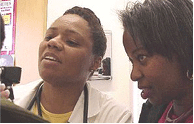|
Free
Adobe Reader Download
Free
QuickTime Player
Instructions for obtaining credit
About
viewing video on the Web
Content
Submission Information
GDAPFT
Website
University
of Detroit Mercy Website
Home
|
|
Welcome
to the Urbanhealth Lifelong Learning Lab!
Below
is a list of our currently available health care learning modules.
Click on a title for detailed information about a module and to
get started.
Please
note: Any plug-in you may need to participate can be found
by clicking the appropriate link on the left side of this page.
- Hyperbilirubinemia:
Recognition, Care and Management of Term and Near-Term Infants
This module
was developed by the Department of Nursing Education at St. John
Hospital and Medical Center, Detroit, Michigan. Principal authors
are Phyllis Staniec, Mary Sullivan, and Michelle Tornopilsky.
Graphic and editing support was provided by William Jun. This
module describes the assessment, treatment strategies and parent/family
education for term and near-term infants. (1.0 Contact Hour)
- Using
the Mental Status Examination to Assess for Organic Brain Disease
(Requires
QuickTime Player and Adobe Reader)
In this lecture delivered
at the 2001 MAPA convention, Sharon Moser discusses how to use
the Mental Status exam as an accurate and valid way to diagnose
organic brain disease, and to determine a measurable level of
functioning for your patient, based on norms for age. Also, it
is an introduction to the use of the MSE as a screening test for
dementia, differentiating between organic and functioning disorders. (3.0 Contact Hours)
- EKG
Module (Requires
QuickTime Player and Adobe Reader)
The
Reading 12 Lead EKG Module is an intermediate level reading 12
Lead EKG course. The module features video presentations that
aid the student in learning how to read and diagnose normal and
abnormal EKGs. Practice cases with 12 Lead EKGs are used to clinically
diagnose various arrhythmias, myocardial infarction (location
specific), ventricular hypertrophy, pericarditis and heart blocks. (3.0 Contact Hours)
- Overview
of Healthcare in the State of Michigan
(Requires QuickTime Player and Adobe Reader)
On
September 23, 2000 the Graduate Medical Education (GME) Innovations
Project and the Greater Detroit Area Partnership For Training
jointly sponsored a conference on Managed Care. The conference
focused on the systematic approach to the Treatment of Chronic
Illness Through Managed Care with a Case Study on Asthma. The
audience was composed of nurse practitioners, physician assistants,
physicians, medical students and residents. Kim Sibilsky, Executive
Director for the Michigan Primary Care Association was one of
the presenters. She
describes the Primary Care Association of Michigan along with
the current status of healthcare in the state; the distribution
of healthcare providers; and the state's health indices. Information
regarding access, community oriented primary care and suggestions
for shaping health policy are provided. (1.0 Contact Hour)
- Managed
Care- What is the Definition Today?
(Requires QuickTime Player and Adobe Reader)
On
September 23, 2000 the Graduate Medical Education (GME) Innovations
Project and the Greater Detroit Area Partnership For Training
jointly sponsored a conference on Managed Care. The conference
focused on the systematic approach to the Treatment of Chronic
Illness Through Managed Care with a Case Study on Asthma. The
audience was composed of nurse practitioners, physician assistants,
physicians, medical students and residents. Bruce
Deschere, M.D, MSBA, Co-Principal Investigator, GME Innovations
Project and Associate Chair and Residency Director, Department
of Family Medicine, Wayne State University, was one of the presenters.
He provides an update of the health care and managed care situation
in the metro Detroit area in 2000. (1.0 Contact Hour)
- Evidence
Based Medicine
(Requires QuckTime Player and Adobe Reader)
On
September 23, 2000 the Graduate Medical Education (GME) Innovations
Project and the Greater Detroit Area Partnership For Training
jointly sponsored a conference on Managed Care. The conference
focused on the systematic approach to the Treatment of Chronic
Illness Through Managed Care with a Case Study on Asthma. The
audience was composed of nurse practitioners, physician assistants,
physicians, medical students and residents. In this
module, Dr. Michael Massanari describes the process of managing
the improvement of clinical performance through a set of questions
pertaining to improving care. Specific resources utilized in gathering
data are provided as well as starting points, for example compliance
with practice guidelines. (1.0 Contact Hour)
- Disease
Management
(Requires
QuickTime Player and Adobe Reader)
Disease
Management involves improving clinical performance by analyzing
the care process, flowcharting the process, developing key measures
and prioritizing opportunities for improvement. A variety of data
management tools are described to assit the provider. A plan for
intervention is presented along with a method to evaluate the
intervention. (1.0 Contact Hour)
- Successful
Living With Chronic Heart Failure (Requires Adobe Reader)
This module was developed by Trinity Health System and is intended
for patients and families dealing with Chronic Heart Failure.
The module teaches the "5-M Method for Successful Living
with Heart Failure." In addition, it contains a Heart
Failure Personal Tool Kit.
- Health
Policy in the Making - Nurses in Political Action (Requires
Real One Player)
University of Michigan School of Nursing's Dean Aida Sue Hinshaw,
PhD, RN, FAAN describes her role in creating the NIH Institue
for Nursing Research.
| |
|
|
|
|


